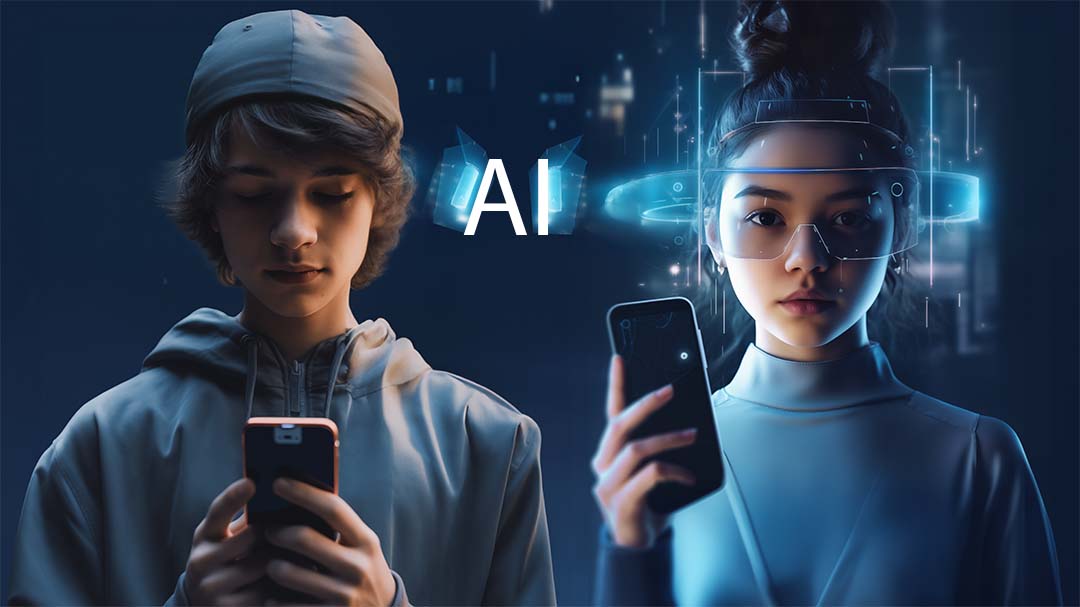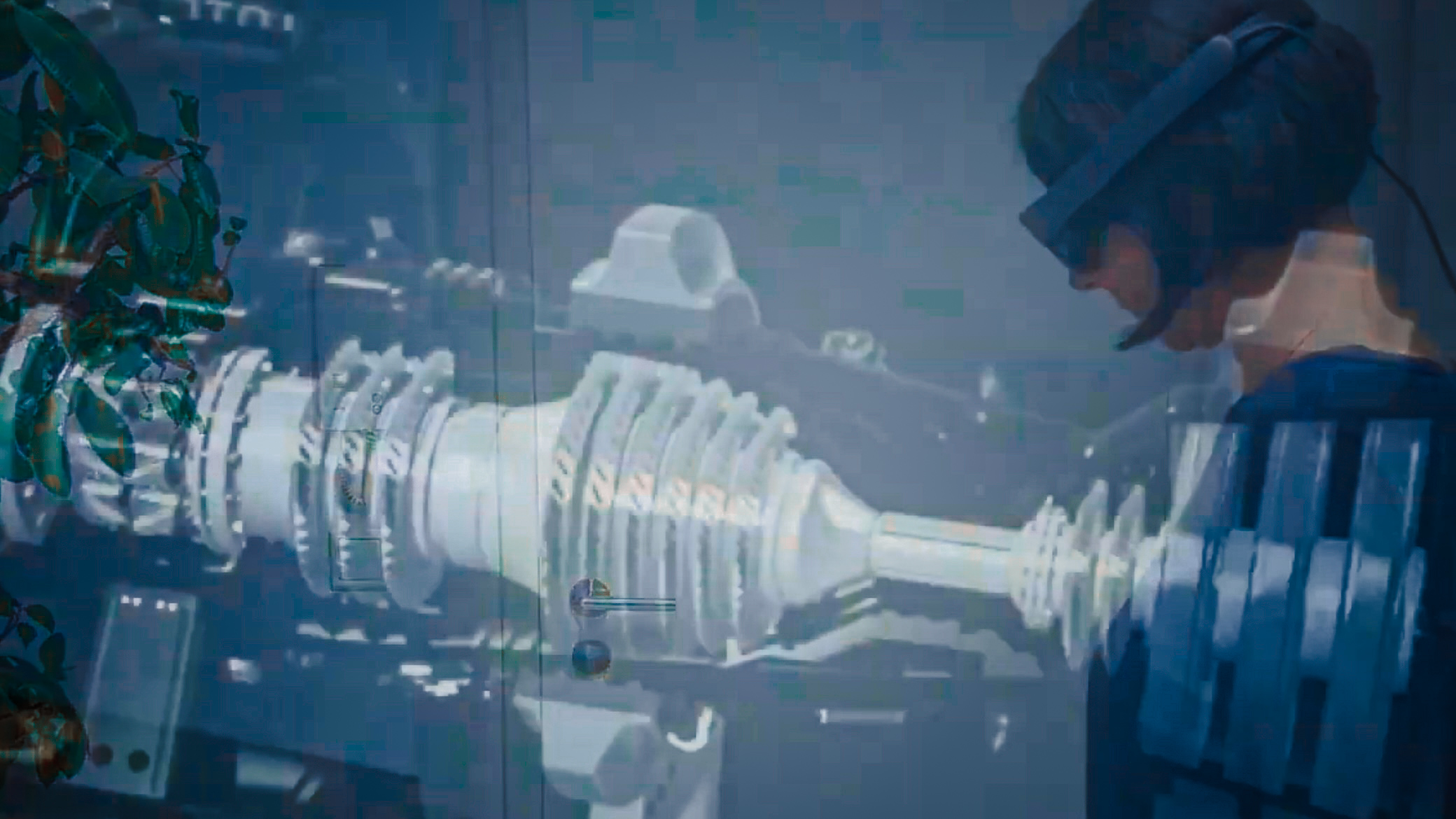AI Smartphones & the Industrial Metaverse | An Article by Ulrich Buckenlei (MBA)
Introduction: The Transformative Role of AI Smartphones in the Industrial Metaverse
The dynamics of technological innovation have reached unprecedented heights, driven by breakthroughs in spatial computing and the emergence of advanced wearables such as the Apple Vision Pro, Quest 3, and Magic Leap 2. These devices are revolutionizing how we integrate digital layers into our daily lives and are opening up new realms of experience by merging physical reality with digital elements.
Smartphones have established themselves as indispensable interfaces in this digital ecosystem, constantly by our side and ready to provide us with a wealth of digital services and information. With the introduction of AI smartphones, a new era of mobile technology begins, transitioning from simple communication devices to intelligent assistants with advanced AI technology. An example of this is the Samsung Galaxy S24 series, which offers innovative features such as real-time voice and text translation, fundamentally changing the way we interact with our devices.
The increasing proliferation of AI smartphones could be crucial for the industrial metaverse, an area that encompasses the integration of digital technologies, virtual environments, and data analytics in the industry. According to a report by Counterpoint Research, between 2024 and 2027, over 1 billion GenAI smartphones are expected to be shipped, with Samsung and Qualcomm as leading players. This development promises new opportunities for collaboration, product development, and process optimization in the industrial sector.
Source: Counterpoint Research.
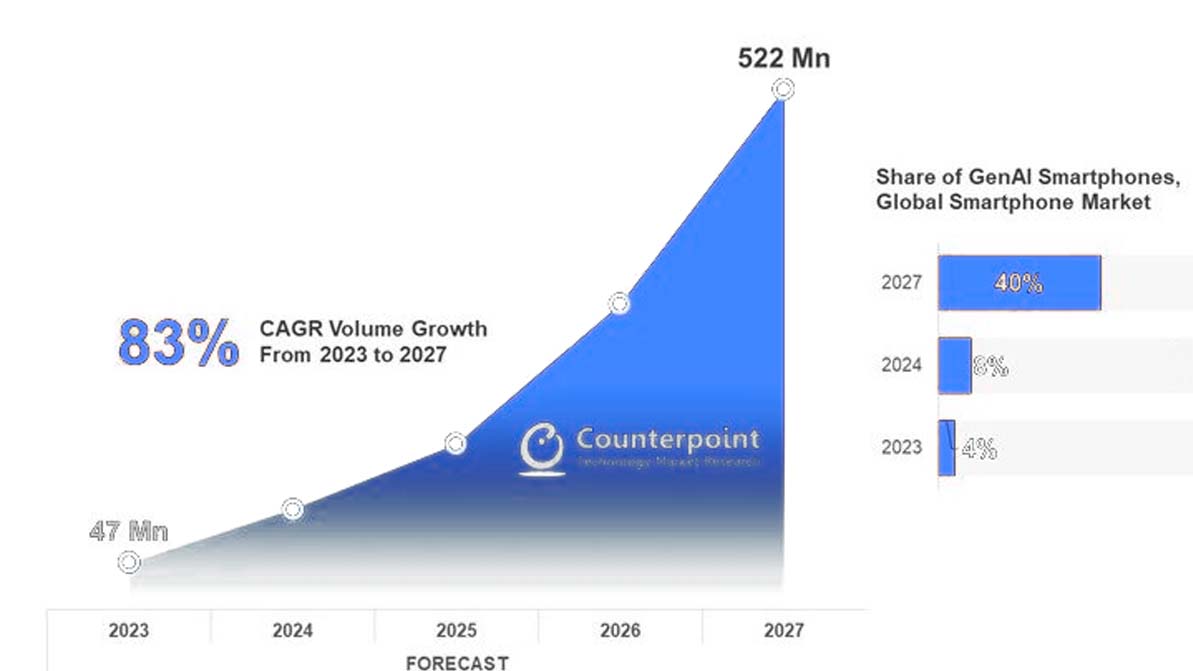
Smartphone 360 Service, GenAI Smartphone Shipments and Insights Report.
Source: Counterpoint Research
Industry Transformation
The use of the Industrial Metaverse by companies for digitalizing their operational processes signals a significant shift in the industrial landscape.
Digital Transformation of Operations: Companies are integrating the Industrial Metaverse to digitally transform their physical processes. This includes the application of AR and VR for optimizing production lines and developing digital twins for improved operational monitoring and maintenance.
Practical Implementation in Industry Sectors: Various sectors such as the automotive, energy supply, and manufacturing are utilizing the Metaverse for efficiency enhancement and innovation. For example, AR technology enables improved design processes and virtual training.
Challenges of Implementation: Integrating the Metaverse into industrial processes presents challenges such as the need for extensive data security and adaptation to new technologies. Companies must find solutions to these challenges to fully leverage the potential of the Metaverse.
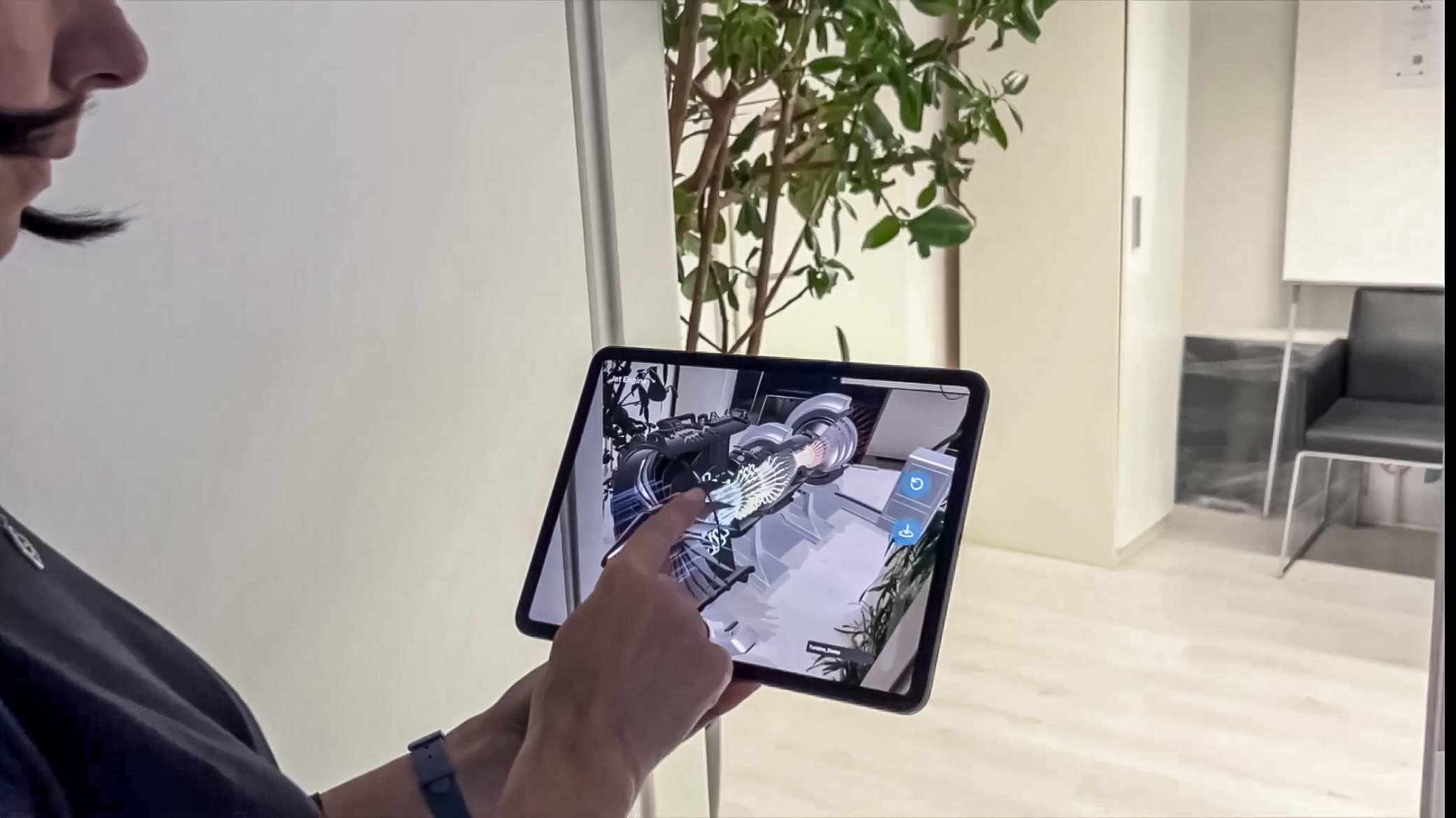
Industry Transformation.
The digital twin of an airplane turbine viewed on an iPad and through the Magic Leap 2 Mixed Reality Headset at the premises of the Visoric XR Expert Team in Munich. Photo: © Ulrich Buckenlei
AI Phones: A New Era in Mobile Technology
The development and definition of AI Phones mark a transformative phase in the world of mobile technology. These devices represent a significant advancement over traditional smartphones through the integration of advanced artificial intelligence.
Definition and Core Features: AI Phones are smartphones equipped with Generative AI. This AI enables the devices to create original content and independently handle complex tasks. For example, the Samsung Galaxy S24 series offers real-time translations and advanced image editing features based on Generative AI.
Market Development and Future Prospects: According to Counterpoint Research, the market share of AI Phones is expected to rise to 40% by 2027, highlighting their growing significance. Leading companies like Samsung and Qualcomm are positioning themselves as pioneers in this segment.
Impact on User Experiences: The AI features in these devices promise an enhanced and personalized user experience by enabling real-time interactions in various languages and taking on complex data processing tasks.
Relevance for the Industrial Metaverse: AI Phones are expected to play a crucial role in the Industrial Metaverse by serving as interfaces for augmented reality and as tools for efficient data processing and analysis.
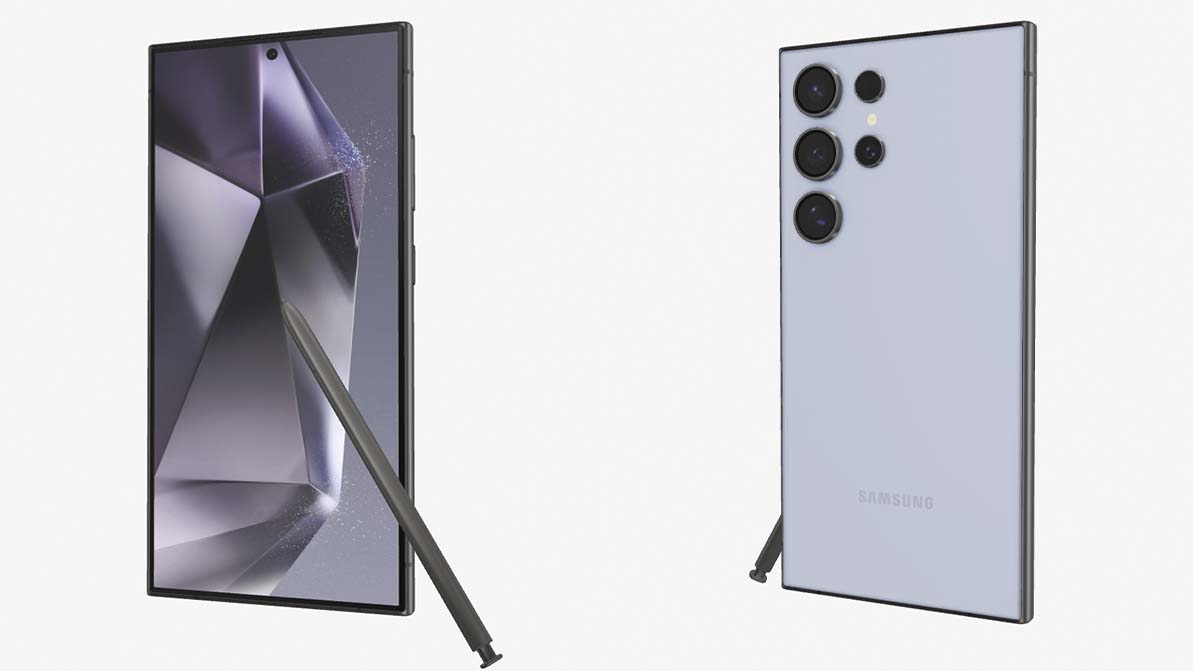
The AI Phone Galaxy S24 Ultra Front and Back View.
Photo: © Samsung
AI Phones as Tools for Efficient Data Processing and Analysis
AI Phones represent a new era in data processing and analysis by leveraging Artificial Intelligence to handle complex tasks more efficiently.
Enhanced Data Processing: Through the integration of AI, AI Phones can quickly and efficiently process large amounts of data. This allows for an improved user experience through fast response times and precise analyses.
Analytical Capabilities: The ability of these devices to analyze data and draw conclusions from it is particularly important for applications in the Industrial Metaverse, where fast and accurate decisions are critical.
Support for Industrial Applications: In industrial applications, AI Phones can be used as powerful tools for monitoring, diagnosing, and optimizing processes, thereby increasing efficiency and productivity.
AI Smartphones as Future Interfaces for Extended Reality (XR)
Expert Opinion – Integration of AR and MR: Experts consider it likely that AI Smartphones will play a central role as interfaces for extended reality, including Augmented Reality (AR) and Mixed Reality (MR). These technologies promise to enable immersive experiences in areas such as gaming, education, and industry through advanced AI features.
Future Technologies – Qualcomm Snapdragon 888: Significant technological advances are expected in the development of AI Smartphones. An example of this is the Qualcomm Snapdragon 888 chip, which, due to its performance, enhanced AI capabilities, and 5G connectivity, is considered a pioneer for future generations.
Emotion Recognition – Personalized Usage: It is predicted that AI Smartphones will be able to recognize and respond to emotions, enabling even more personalized use. Further developments in emotion recognition and machine learning could lead to virtual assistants that offer more human-like reactions and interactions.
Health Technologies – AR and AI Vision: Advances in AR and AI Vision could bring about revolutionary health apps capable of detecting diseases such as skin or pancreatic cancer by analyzing user data.
Enhanced Navigation – Location and Mapping Technology: Future developments could equip AI Smartphones with advanced location and mapping technology, making decisions based on the moods and preferences of users and thus allowing a deeper integration of physical and digital worlds.
Sources: Qualcomm, Edgy Labs, TechHQ.
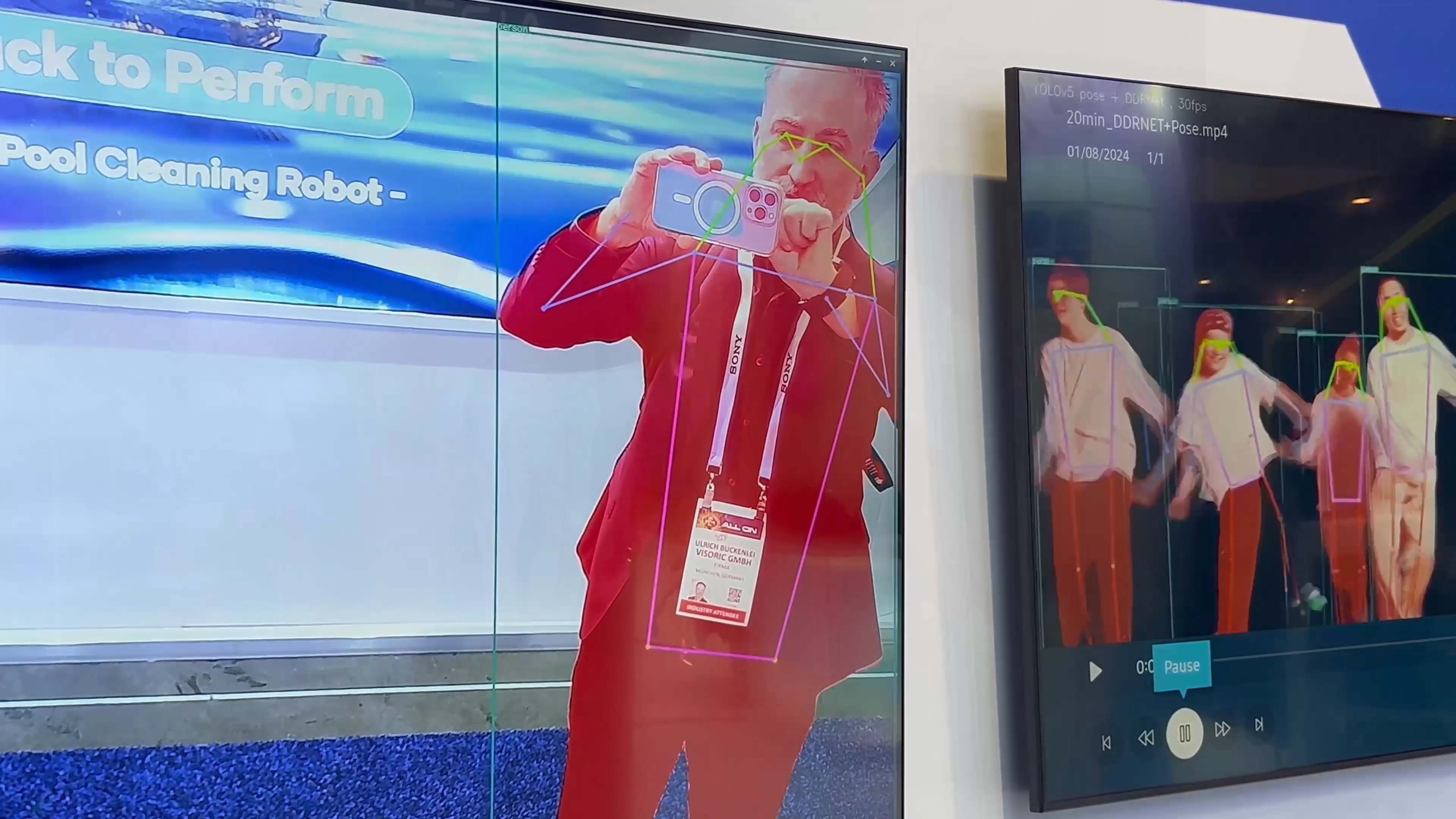
Impressions from CES 2024 in Las Vegas (USA).
Photo: © Ulrich Buckenlei, CES 2024, Las Vegas
AI Smartphones and Their Future Role in the Industrial Metaverse
AI Smartphones – Bridge Between Worlds: Experts predict that AI Smartphones will crucially contribute to bridging the real with the digital world, especially in the context of the Industrial Metaverse. By integrating technologies such as digital twins, AI, extended reality, and cloud computing, AI Smartphones will become central instruments creating a powerful interface between the physical and digital worlds. This development promises seamless integration and interaction within the Industrial Metaverse.
Immersive Technologies – Interaction and Collaboration: Integrating AI Smartphones with cloud technologies like Microsoft’s Azure and Spatial Computing headsets like the Apple Vision Pro or Magic Leap 2 can enable a novel form of collaboration. AI Smartphones could become key tools to deliver immersive experiences and enhance interaction between humans and machines. These devices could enable remote monitoring, control, and optimization of complex systems in the Industrial Metaverse, providing an intuitive and efficient interface.
Value Creation and Efficiency – Business Benefit: Through real-time data processing and analysis, AI Smartphones could support companies in making more efficient decisions. The ability of these devices to process complex information and provide action recommendations based on AI-based predictions could revolutionize business processes in the Industrial Metaverse. Utilizing these technologies leads to direct financial benefits, promotes sustainability, and enhances employee efficiency.
Technological Challenges – Innovation and Partnership: Realizing the Industrial Metaverse through AI Smartphones requires innovative solutions and cross-industry partnerships
These devices stand at the forefront of development, serving as interfaces for interacting with digital twins and other Metaverse components. The creation of a seamless, interoperable, and secure ecosystem that includes AI Smartphones, digital twins, and other technologies is crucial for the successful implementation of the Industrial Metaverse.
Sources: Microsoft Industry Blogs, World Economic Forum, MIT Technology Review.
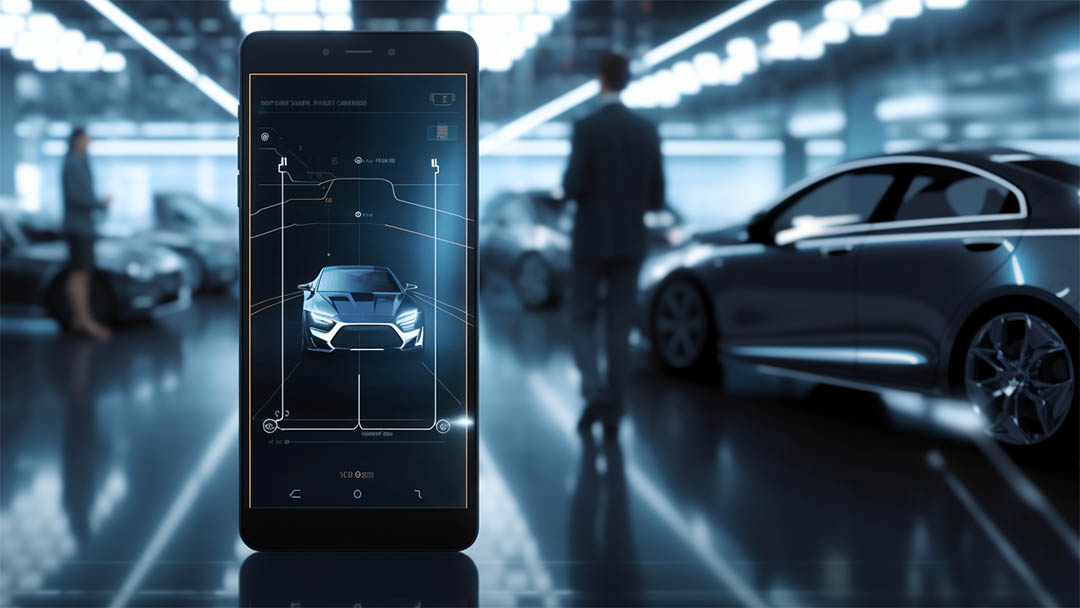
AI Phones and Their Potential Key Role in the Industrial Metaverse.
Illustration ©Ulrich Buckenlei
Potential Future Scenarios of AI Smartphones in the Industrial Metaverse
The variety and innovation of potential future scenarios for AI smartphones in the Industrial Metaverse could revolutionize our interaction with the digital world, supported by research and developments in areas such as digital twins, AI, augmented reality, and automation.
Intelligent Maintenance Support – AR Integration: According to current research, digital twins and AR technologies enable AI smartphones to act as intelligent assistants for maintenance and repair work. The integration of AR provides technicians with detailed instructions and supports error diagnosis and repair in complex industrial environments (TechTarget, 2023).
Automated Safety Monitoring – Real-Time Analysis: AI smartphones could play a key role in monitoring safety risks in hazardous work environments. Their ability to analyze real-time data allows them to detect potential dangers early and issue warnings to prevent accidents (World Economic Forum, 2023).
Optimization of Production Processes – AI-Based Analysis: In production environments, AI smartphones could be used to monitor and optimize manufacturing processes. Their AI-based analytical capability provides valuable insights to identify bottlenecks and suggest efficiency improvements (Microsoft Industry Blogs, 2024).
Facilitation of Remote Work – Connection to the Metaverse: AI smartphones could play a central role in facilitating remote work by establishing a seamless connection to the Industrial Metaverse. This would allow employees to interact in real-time with colleagues and machinery from a distance, increasing work flexibility and efficiency (TechTarget, 2023).
These scenarios illustrate the transformative potential of AI smartphones in the Industrial Metaverse and emphasize the importance of technologies such as digital twins, AR, AI, and cloud computing for the future of industrial work and interaction. For more information, see the sources: TechTarget, 2023, World Economic Forum, 2023, and Microsoft Industry Blogs, 2024.
Summary and Outlook
In conclusion, the discussed future scenarios and research findings highlight the enormous potential of AI smartphones as transformative forces in the Industrial Metaverse. These technologies not only serve as a bridge between the physical and digital worlds but also offer innovative solutions for Industry 4.0. The integration of AR, AI, digital twins, and real-time analysis in AI smartphones will fundamentally change the way we work, communicate, and interact. These developments are expected to lead to more efficient, safer, and more flexible working environments while also opening up new possibilities for remote work and process optimization. As we continue to move towards realizing these future visions, it is essential that industries, researchers, and technology developers collaborate to address the challenges and fully seize the opportunities that the Industrial Metaverse offers.
About the Author:
Ulrich Buckenlei, born on January 7, 1975, in Regensburg, is a renowned digitalization strategist and visionary in the field of the Industrial Metaverse and Spatial Computing.
He holds a diploma as a technical editor and an MBA from the Technical University of Munich.
As the founder, managing director, and creative director of VISORIC GmbH, he has made a name for himself in the industry. VISORIC specializes in AR, VR, and 3D real-time visualization and advises a wide range of clients worldwide, including well-known brands, large authorities, publishers, and organizations as well as medium-sized and smaller companies.
Ulrich Buckenlei’s clients include well-known companies such as BMW, Audi, Siemens, the news magazine Der Spiegel, Magic Leap, Discovery Channel, ZDF, and the Bavarian Ministry of Economic Affairs. Buckenlei is actively committed to digital transformation and the development of innovative technologies.

Impressions from Bryce Canyon National Park, USA.
Photo: © Ulrich Buckenlei during CES 2024
Are you ready to conquer the world of XR and need expert advice for implementation in your business?
The Visoric team is full of enthusiasm to accompany and support you on your exciting innovation journey.
Here’s how to reach us!
Email: info@xrstager.com
Phone: +49 89 21552678
Contact person:
Ulrich Buckenlei (Creative Director)
Mobile +49 152 53532871
Email: ulrich.buckenlei@xrstager.com
Nataliya Daniltseva (Project Manager)
Mobile + 49 176 72805705
Email: nataliya.daniltseva@xrstager.com
Address:
VISORIC GmbH
Bayerstraße 13
D-80335 Munich


